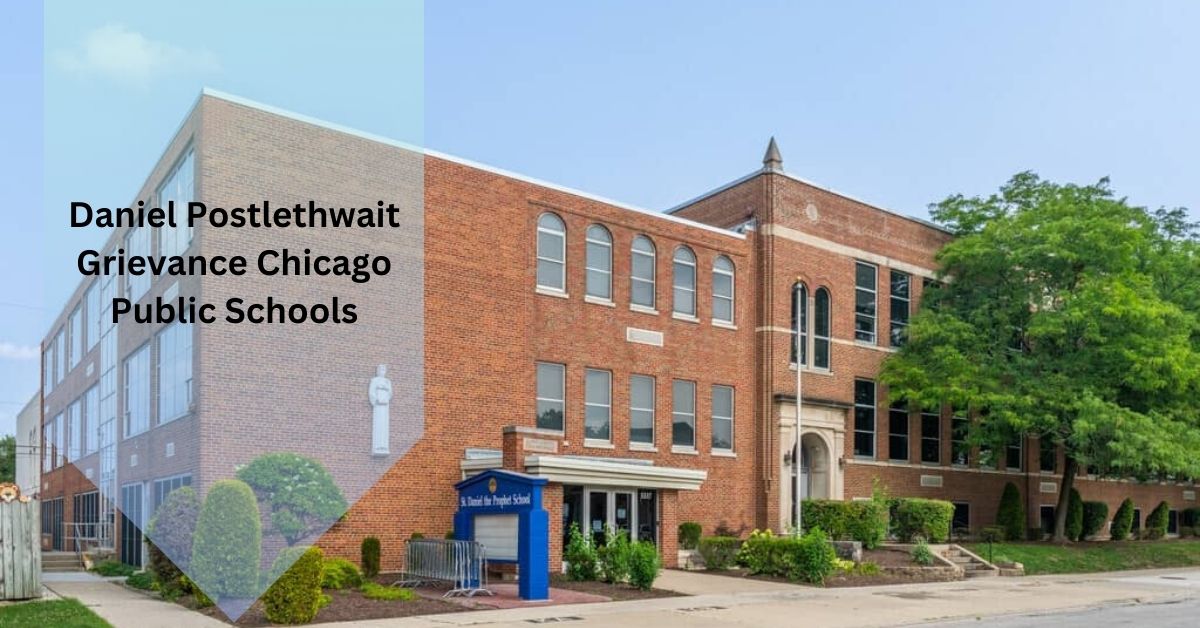Daniel Postlethwait Grievance Chicago Public Schools – Understand Cps Controversies!
Introduction:
The Chicago Public Schools (CPS) system, one of the largest and most complex educational systems in the United States, frequently faces various administrative and legal challenges. One notable case that has drawn attention is the grievance involving Daniel Postlethwait.
This article delves into the details of the Postlethwait grievance, exploring its origins, implications, and broader impact on CPS. By examining the context, key issues, and responses, we aim to provide a comprehensive analysis of this significant case.
Background of the Postlethwait Grievance:
The Origin of the Dispute
The grievance filed by Daniel Postlethwait against Chicago Public Schools centers around allegations of unfair treatment and procedural violations. As a prominent figure within the CPS system, Postlethwait’s case has garnered attention due to its potential implications for educational policy and labor relations within the district.
Key Issues Raised
- Unfair Treatment: The core of the grievance involves claims of discriminatory or unfair treatment towards Postlethwait, which could include issues related to employment practices, promotions, or workplace conditions.
- Procedural Violations: Postlethwait has alleged that CPS did not adhere to established procedures, potentially affecting the fairness of administrative decisions and actions taken against him.
- Impact on Career: The grievance also addresses how these issues have impacted Postlethwait’s career progression and professional standing within the CPS system.
Detailed Analysis of the Grievance:
Allegations of Discrimination
One of the primary components of the grievance is the allegation of discrimination. This could encompass various forms of bias, including but not limited to racial, gender, or age discrimination. Understanding these allegations requires a deep dive into Postlethwait’s experiences and the specific instances where he believes discrimination occurred.
Examination of Procedural Issues
Procedural fairness is crucial in any large organization. The grievance highlights possible lapses in CPS’s adherence to established procedures. This section will analyze how procedural errors might have influenced the outcome of Postlethwait’s case and the broader implications for CPS’s administrative practices.
Career Implications
The impact of the grievance on Postlethwait’s career is a significant concern. This includes evaluating how the alleged unfair treatment and procedural violations have affected his professional trajectory, reputation, and opportunities within the educational system.
Also Read: Eleanor Daugerdas – Unraveling the Legal Saga!
CPS’s Response and Actions:
Administrative Response
In response to the grievance, CPS has likely undertaken various administrative actions to address the concerns raised. This section will review CPS’s official statements, investigations, and any corrective measures implemented to resolve the issues.
Legal Proceedings
If the grievance has progressed to legal proceedings, this section will cover the status of these proceedings, including any court rulings or settlements. The legal aspect is crucial in understanding the resolution of the grievance and its impact on CPS policies.
Reactions from the Educational Community
The educational community’s response to the grievance can provide insights into the broader implications for CPS and similar educational systems. Reactions from educators, administrators, and policymakers will be explored to gauge the case’s impact on the field.
Strategies for Addressing Grievances:
Best Practices for CPS
- Transparent Processes: Ensuring transparency in administrative decisions and grievance processes can help prevent disputes and build trust among employees.
- Effective Communication: Clear communication between administration, employees, and unions is essential for resolving issues and preventing misunderstandings.
- Support Systems: Implementing support systems for employees to voice concerns and seek resolutions can improve overall workplace satisfaction and productivity.
Role of Unions
- Advocacy and Representation: Unions play a crucial role in advocating for employees’ rights and addressing grievances. Strengthening union representation and support mechanisms can enhance their effectiveness.
- Negotiation Strategies: Effective negotiation strategies can help resolve grievances more efficiently and amicably. Understanding these strategies is important for both employees and administrators.
Broader Implications for Chicago Public Schools:
Policy Reforms
The Postlethwait grievance may lead to significant policy reforms within CPS. This section will analyze potential changes in policies or procedures aimed at preventing similar grievances in the future.
Impact on Employee Relations
The case highlights important issues in employee relations within CPS. Understanding these implications can provide valuable lessons for improving workplace conditions and ensuring fair treatment for all employees.
Lessons Learned
The grievance offers several lessons for CPS and other large organizations. This section will summarize key takeaways and best practices for addressing grievances, ensuring procedural fairness, and fostering a positive work environment.
Also Read: Duke Dennis’s Height – Exploring the Physical Stat!
Future Outlook:
Anticipated Changes
- Policy Adjustments: CPS may make adjustments to its policies and procedures based on the outcomes of this grievance. These changes aim to improve grievance handling and overall employee relations.
- Continued Monitoring: Ongoing monitoring and evaluation of grievance processes and employee satisfaction will be important for ensuring that lessons learned from this case are applied effectively.
Broader Implications
- Impact on Other School Districts: The outcome of this case may have implications for other public school districts facing similar issues. Sharing best practices and lessons learned can benefit the wider educational community.
- Educational Environment: Ultimately, addressing grievances effectively contributes to a positive educational environment, benefiting students, teachers, and the community as a whole.
FAQ’s:
1. What is the Daniel Postlethwait grievance about?
The grievance involves allegations of unfair treatment and procedural violations by Chicago Public Schools against Daniel Postlethwait.
2. What specific issues does Postlethwait raise in his grievance?
Postlethwait’s grievance includes claims of discriminatory treatment and procedural errors affecting his career within CPS.
3. How has Chicago Public Schools responded to the grievance?
CPS has undertaken administrative actions and investigations to address the concerns raised in the grievance.
4. Have there been any legal proceedings related to the grievance?
If applicable, this section will detail the status of any legal proceedings or court rulings related to the grievance.
5. What impact has the grievance had on Postlethwait’s career?
The grievance has affected Postlethwait’s career progression and professional standing within CPS.
6. What changes might result from the Postlethwait grievance?
Potential policy reforms and changes in administrative practices within CPS may arise from the case.
7. How can similar grievances be prevented in the future?
Implementing best practices for procedural fairness and addressing employee concerns can help prevent similar issues.
8. What has been the reaction of the educational community to the grievance?
Reactions from educators and policymakers provide insights into the broader impact of the case on the educational system.
Conclusion:
The Daniel Postlethwait grievance against Chicago Public Schools represents a significant case with far-reaching implications. By examining the details of the grievance, CPS’s response, and the broader impact, this article provides a comprehensive understanding of the issues at hand. The case underscores the importance of fair treatment, procedural adherence, and effective resolution mechanisms in maintaining a functional and equitable educational system.
Read More:


![[noblocc] kicked for being afk](https://relictimes.com/wp-content/uploads/2024/11/image-ezgif.com-webp-to-jpg-converter-2024-11-20T140233.477-1.jpg)


![[noblocc] kicked for being afk](https://relictimes.com/wp-content/uploads/2024/11/image-ezgif.com-webp-to-jpg-converter-2024-11-20T140233.477-1-300x200.jpg)








Post Comment